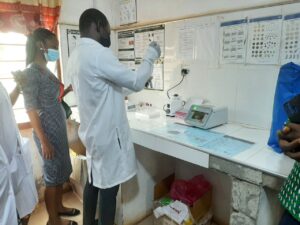Sickle cell diagnostic device study launched in Navrongo
 The Navrongo Health Research Centre (NHRC) in the Kassena-Nankana Municipality of the Upper East Region has launched a new study into a point of care diagnostic device for easier and faster diagnosis of sickle cell disease in children.
The Navrongo Health Research Centre (NHRC) in the Kassena-Nankana Municipality of the Upper East Region has launched a new study into a point of care diagnostic device for easier and faster diagnosis of sickle cell disease in children.
The NHRC with funding from Novartis in collaboration with the Ghana Health Service (GHS) in the Region and the Sick kids Hospital in Toronto and Hemex would conduct a pilot study of the device in some selected health facilities in the Kassena-Nankana Municipality and the Kassena-Nankana West District for a period of 18 months in children five years and below.
Dr Patrick Odum Ansah, the Acting Director of the NHRC and the Principal Investigator of the study, in an interview with the Ghana News Agency (GNA) in Navrongo, after a brief launch, said the device was approved for use by the Food and Drugs Authority (FDA).
“However, the missing link is that most of the diagnoses are done at the hospitals, and we lose out a lot because most of the deaths and late diagnoses come from the communities. So, the NHRC with its demographic surveillance infrastructure took up the study to ensure early diagnoses are made available in the communities,” he said.
Dr Ansah explained that “We will pick just two microliters of blood and screen for the sickle cell gene. The machine can give us percentages of different genotypes.
“For instance, if a child has some amount of haemoglobin ‘S’ tested on the machine, then we know it is possible the child will have either the carrier gene or full sickle cell disease. Such children will be referred to the War Memorial Hospital for confirmation and enrolled into the sickle cell clinic.”
“So within 15 minutes, we are able to know the gene a child is carrying, and within a day, we are able to confirm the exact genotype of the child,” the Acting Director said.
Dr Ansah said counselling sessions would be organized for parents of children who may be diagnosed of sickle cell disease, and the sickle cell clinic would follow-up on them.
“We believe that once they are picked up early and put on treatment, the number of children we lose to sickle cell disease, the number of visits to health facilities and the pain associated with the disease will drastically reduce,” he said.
The Acting Director noted that children with sickle cell disease were mostly diagnosed very late at a time they might have developed complications, saying “Most of them die before the age of 18 years.”
He said the pilot study, with the support of the GHS would be adopted and scaled-up for use at the Community-based Health Planning and Services (CHPS) compounds across the Region and country to screen children as part of their postnatal visits after a successful study.
Mr Benson Azure Nso, the Kassena-Nankana Municipal Director of the GHS, said the management of sickle cell disease posed great stress to families and the healthcare system, “So if we are able to find a way of managing this condition at the community level, it will be a relief.”
He said the Municipality recorded as low as 0.2 per cent of sickle cell cases from 2020 to mid-year 2022 and indicated that the Municipality could have recorded more cases if there was a system for more screening.
Mr Nso thanked the NHRC, the Sick Kid Hospital in Toronto and Novartis for the initiative and gave the assurance that the Municipal and District Health Directorates in the beneficiary areas would support the study to ensure its success.
Source: GNA
